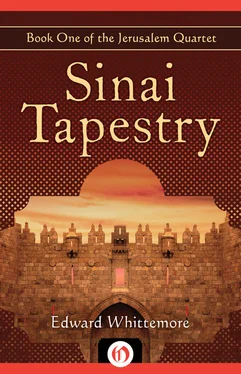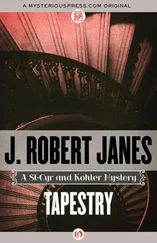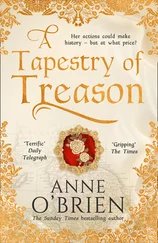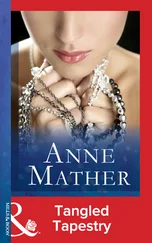Seeing the pathetic thinness of the man’s legs and the unnatural luster of his eyes, which he took for fever or worse, Stern begged him to accept his waterskins and other supplies. He even offered to float him to the nearest oasis if he was unable to walk, as seemed likely. But the wretched man abjectly refused everything. Instead he asked in the humblest of whispers, his voice trembling, if he might have the honor of knowing his host’s name.
Stern told him. The Arab thanked him reverently, whereupon he backed away still on his knees and continued doing so for the rest of the morning until he had crossed the horizon and was out of sight.
Once during the morning Stern happened to glance across the desert in the direction of the retreating Haj Harun who was now a mere dot on the crest of the dunes, still struggling backward on his knees, but Stern didn’t really see him and the crazed behavior of the old man made no impression on him. Instead he was busily turning the pages of his notebooks planning new routes for smuggling arms.
Initially there were some successes.
In 1914 the kaiser’s government was persuaded to pay regular bribes to both the Sherif of Mecca and his chief rival Emir ibn Saud, and Stern ferried German revolutionary orders from Damascus to Jidda. But nothing came of it because the Arabs wouldn’t do anything and the English were soon paying them more.
That same winter he arranged a secret meeting near Cairo with an influential English suffragette, a composer of comic operettas who had recently returned from an expedition to the Sudan where she had spent a long afternoon in the privacy of her riverboat cabin photographing a comely young hermaphrodite, a camel breeder currently known as Mohammed but formerly the wife of a tribal sheik.
The sheik had beaten his wife constantly, as the suffragette learned in the course of taking her photographs. Moved by the compassion she always felt for a woman who had suffered the prejudices of the world, she ended the afternoon by making passionate love to Mohammed. But to her great disappointment none of her photographs had turned out.
Stern took her to a Greek artist in Alexandria who was able to render exactly what she had seen, thereby gaining the suffragette’s support and propaganda for his cause in her subsequent operettas.
In 1918 Zaghlul was freed from internment and returned to Egypt to demand independence. In 1919 Kemal embarrassed the British by defying the sultan and the Persians resisted their British treaty. Shortly thereafter there were Arab revolts in both Syria and Iraq.
But there were also signs of coming failure in those early years.
In Constantinople the sultan had confiscated modern textbooks because he had learned they contained the subversive formula H2O, which meant that he, Hamid II, was secretly a cipher and good for nothing.
In 1909 the Turks had massacred twenty-five thousand Armenians in Adana. In 1915, deciding there would no longer be an Armenian question if there were no Armenians, the Turks began marching them into the Syrian desert and murdering them along the way to speed the devastations wrought by starvation and epidemics.
By 1916 legions of spies had descended on Athens only to be surpassed three years later by the even greater hordes of spies congregating in Constantinople, where it was found that certain national representatives on their way to the Versailles peace conference could neither write their names nor recognize them when spoken to.
At a little-known meeting in 1918 between Weizmann and the future Grand Mufti of Jerusalem, the dignified and seemingly innocent Arab revealed his profound capacity for delusion and hate by softly quoting passages from the Protocols of the Elders of Zion.
And worst of all for Stern, the collapse of the Ottoman Empire at the end of the First World War wiped out the investments his father had left him after the former explorer and hakïm, on the eve of Stern’s departure for Europe, had performed what he thought was his final act of healing by relieving his son of the burdensome legacy of that Empire he had acquired before Stern was born, an irony immense enough to divide their two centuries forever.
After 1918 Stern never had any money again. He had to sell his balloon and thereafter he became poorer and poorer, continually begging and borrowing from everyone he met in order to live, his income from smuggling, when there was any, always going for more arms because he wouldn’t touch it himself.
Yet somehow as he sank deeper and deeper into debt in 1920 and 1921, so deep he knew he would never retrieve himself, he still managed to give the impression he was completely confident in what he was doing, a trait he had learned from observing his father and grandfather perhaps, although with them the confidence had been real.
In any case Stern was so convincing only a few people ever knew the truth, only the three people who were close to him over time.
Sivi, then as before the war.
O’Sullivan Beare a year later in Smyrna when he made his last trip for Stern and broke with him.
And finally Maud a decade after that when the first victims of Smyrna were beginning to fall in that small chance circle of revolving lovers and friends and relatives, all of whom eventually came to discover their lives had once irreparably crossed on a warm September day in that most beautiful of cities on the shores of the Eastern Mediterranean.
Late one cold December afternoon in 1921 O’Sullivan Beare sat slumped in a corner of an Arab coffee shop near Damascus Gate, a glass of wretched Arab cognac empty on the table in front of him. Outside a heavy wind groaned on the rooftops and pushed through the alleys, threatening snow. Two Arabs listlessly played backgammon by the window while a third slept under a newspaper. Night was falling in the street.
Empty as empty out there, thought Joe, not a body stirring and right they are, warm and home with the family where any sane man belongs tonight. Why did the old father back in the Aran Islands have to go seeing a place like this for me? Bloody trouble, that’s what prophecy is, I could have caught fish like him and maybe been content with a decent pint by the lire on bad nights sharing a song and a dance with the neighbors. Mad Arabs and Jews hustling about, a soul doesn’t need the bloody ups and downs of a Jerusalem, Jaysus knows.
The door opened and a large hunched man came in rubbing his hands against the cold. He stamped his feet and smiled. Joe nodded. Moves softly for a big man, he thought. Moves as if he had some place better to go than this dead Arab excuse for a pub and maybe he has who knows.
Stern pulled back a chair. He ordered two cognacs and sat down.
You’re having us take our lives in our hands with that item, said Joe, making his fingers into a pistol and firing once at both their heads. Same business they use to fill the lamps. Saw them doing it, swear I did, just before you showed up. Burns better than anything else, the man said, and is cheaper in the bargain.
Stern laughed.
I thought it might help keep the wind out.
Not likely, be nice if it did. But who’d believe it I want to know. If anybody at home had said the Holy Land could be like this I’d have thought they were waterlogged in the head, been lying out in a bog too long sleeping one off. Sun and sand and milk and honey I thought it was, but this is worse than rowing around my island in a gale. At least then you were fighting the bloody currents all the time and didn’t have time to worry your mind with things but here you just sit and wait, you think and then you sit and wait some more. Bloody wonder how people in this city just sit and wait.
They take the long view, said Stern with a smile.
Seems they do, that must be it. True religion I suppose. Jerusalem the city of miracles. The other day an old Arab I know and myself took a wander in to look at the Dome of the Rock and what’s he begin to do but stare and stare at a little chink on one side of the rock. Hello there, I said, is that chink something special? It is, he said, it’s the footprint Mohammed’s horse made when the Prophet climbed on his horse here and rode off to heaven. I was just remembering how the sparks were flying then, he said, and the horns sounding and the cymbals clanging and thunder and lightning shaking the sky.
Читать дальше












